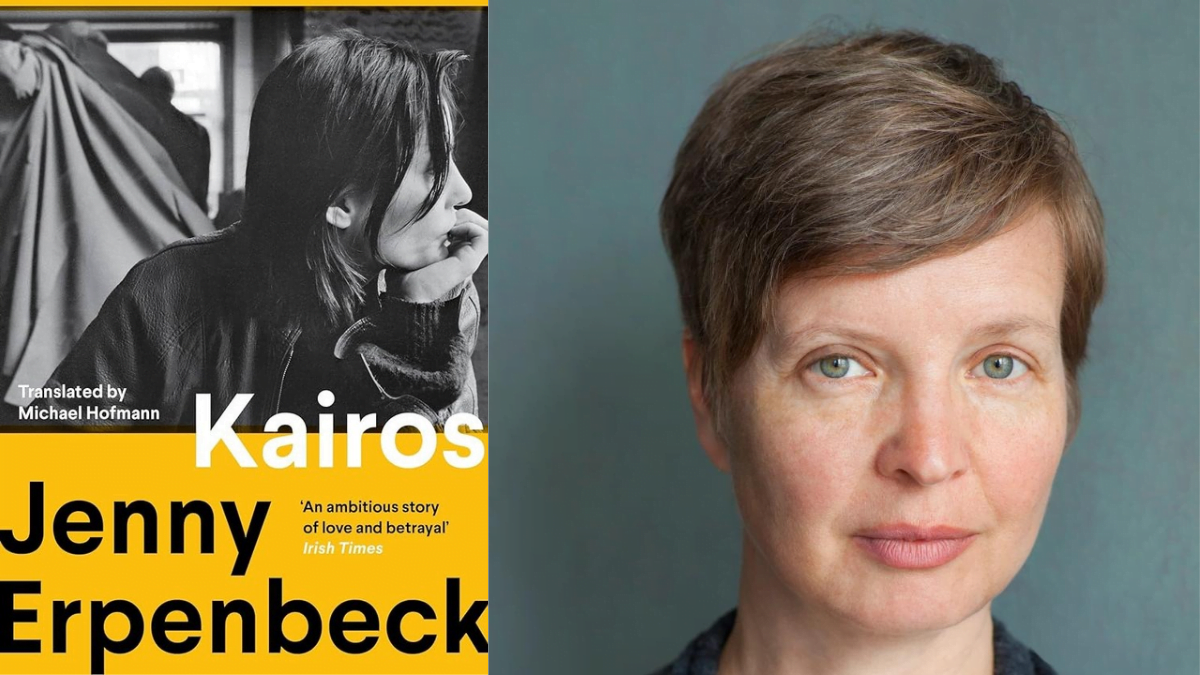What makes a country, and what makes people? This is the central question of Jenny Erpenbeck’s Kairos (pub. 2021, trans. By Michael Hoffman 2023), a book that won the International Booker Prize in 2024 and Germany’s Uwe Johnson Prize in 2022. Throughout Kairos, runs the conceit of comparing a romantic relationship to the crumbling of East Germany and a nation that no longer exists, and in an interview, Erpenbeck comments on it, saying, ‘It’s a private story of a big love and its decay, but it’s also a story of the dissolution of a whole political system. Simply put: How can something that seems right in the beginning, turn into something wrong?‘
True to her words, Kairos is a breathless tale of deceit, politics, and above all, love, big enough to crumble the lives of those who are entangled in its web, no matter how tangentially.
True to her words, Kairos is a breathless tale of deceit, politics, and above all, love, big enough to crumble the lives of those who are entangled in its web, no matter how tangentially. For Erpenbeck and Hoffman alike, this award comes as a first of many: Erpenbeck is the first German author to with the International Booker Prize, just as Hoffman is the first male translator to win the prize.
The plot of Kairos
‘Kairos, the god of fortunate moments, is supposed to have a lock of hair on his forehead, which is the only way of grasping hold of him. Because once the god has slipped past on his winged feet, the back of his head is sleek and hairless, nowhere to grab hold of.‘
When Katherina meets Hans, a writer, and an intellectual, thirty-four years her senior, it is a rainy day in Berlin, East Germany. She later wonders, ‘Was it a fortunate moment, then, when she, just nineteen, first met Hans?‘
When Katherina meets Hans, a writer, and an intellectual, thirty-four years her senior, it is a rainy day in Berlin, East Germany.
Falling in love with someone significantly older, as well as at a stage of sexual maturation far advanced than oneself, is always a gamble, and Katharina stumbles into her relationship with Hans, even as her circle around her tells her not to jump into a relationship. As the GDR crumbles around them and East Germany gets merged with the West, Hans and Katharina’s relationship grows increasingly toxic, reaching its crescendo in a single act of betrayal. Kairos is the story of a nation, crumbling under the weight of youth,
Toxic romance and isolation
What is it, to be in love with a person who is much older than you, and much more experienced than you, in all the ways of the world? In Kairos, Katharina’s friend Ruth tells her, ‘Since you’ve been with Hans, you’ve lost your radiance.‘ It’s got all the hallmarks of a toxic relationship, that of a close friend, one that we see play out in front of our eyes, and are powerless to stop it. Hans falls in love with the idea of Katharina, a person whose youth and naivete imply that he can mold her to his preferences, and he does it, too:
‘While he was living with Katharina in the strange apartment, he took a lot of trouble fitting her out, her, Katharina. Provided her with everything that made him feel at home. Bach, Beethoven, Brecht, Busch, Chopin, Eisler, Giotto, Goya, Grunewald, Hacks, Kafka, Lenin, Thomas Mann, Marx, Mozart, Neher, Steinberg, Verdi, Robert Walser. In alphabetical order. Order is the fear of disorder.’
In Kairos, Hans’ training of Katharina into her becoming the person he wants her to be is not lost on himself, he muses, right after, ‘Was he just looking for a more attractive mirror for himself in her young flesh? In his solitude, someone who can answer back to him? Or did he really share all that out of love? She was the cause of his banishment. Love, love, love, he says to himself, all at once the word seems quite empty.‘ Hans and Katharina’s love perseveres, despite him never truly acknowledging it and never removing himself from his marriage.
Hans is systematically unfaithful to his wife, and for Katharina, the knowledge of his numerous other affairs serves as a continual reminder of the people that have come before her, and what might happen to her one day, when she loses Hans’ love. Even a chance encounter on the street might be unbearable, and it is explained by her friend, Andre, who says, ‘You are what she used to be, and maybe one day you’ll be what she is now.’
Just like the GDR, Hans and Katharina’s relationship falls apart at the seams in Kairos when she leaves for Frankfurt and gets involved with a colleague, Vadim. All at once, Hans is confronted violently with the knowledge that Katharina is not a doll or a piece of clay he can mold into his liking, and his world is shattered, Katharina’s is, too, when he holds her responsible for his mental breakdown. ‘How could you do such a thing to me?‘ is his second question, before he even asks her the reason for this betrayal.
He forgives her once, before writing, ‘What may have looked like a happy end yesterday was a measure undertaken in pure despair and offers us nothing. if I hadn’t repossessed this body immediately, then disgust and images of what you have just done with another would have settled in my brain forever. the main task is still to be accomplished.‘ For him, Katharina’s psyche exists independently of her body, in a plane of reality that he deems closer to himself than her physical existence.
Hans punishes Katharina over and over in Kairos, but in punishing her, who he had created in his own image, he is also punishing himself. It is a relationship that we may never truly understand, the relationship between the Hunter and the Hunted, between predator and prey. In their happier moments, Hans takes Katharina to a museum, where they look at the Titans fighting the Olympians: ‘See how close they are, says Hans, the intimacy of battle, and how well-matched they are. See how alike are love and hate.’
Hans takes Katharina to a museum, where they look at the Titans fighting the Olympians: ‘See how close they are, says Hans, the intimacy of battle, and how well-matched they are. See how alike are love and hate.’
Even in her hate for him, Katharina is aware of how much she loves him, how much she loves the man who has shaped her very existence, pieced her consciousness, and made her fit for the world. And yet, this is not enough. What remains of a relationship that was built on the ashes of another’s betrayal, save for its own eventual downfall? When Hans and Ingrid are talking about the future of their marriage, a relationship that Hans has ignored for decades in favor of his mistresses, Katharina follows them to the bar where they are conversing, deciding the fate of not only them, but her life as well, in a setting where she is not allowed to participate:
‘A little later she’s standing outside it, and through the glass door sees Hans inside sitting at a table and talking with his wife, the wife has her back to her, but Hans, she observes from a glance, has registered her presence. Katharina spends an hour and a half outside, freezing, waiting for a signal from him, but no signal is forthcoming. Inside, decisions are being made affecting her future, but because Katharina can’t hear what they are, she is still uniquely stuck in the past. As Hans pays, Katharina retreats into the shadows, she sees them emerge onto the street, not arguing, talking calmly to one another, but Katharina is too far away to hear what they are saying.’
Katharina is realising the importance of societal license; in that moment, she is no one of any importance to Hans, even if he says she is. She’s aware of how Hans is using her betrayal as a method of control, and she allows herself to be controlled anyway, ‘Isn’t it Hans who makes her continually think of Vadim?‘ because she still operates under the impression that she loves him—Hans, and not the idea of a father figure. The moment she admits it to herself and to him, their relationship can no longer stand, because the truth, as they say, is finally out: ‘For the first time, she thinks maybe she has been looking for a father after all, someone who loves her unconditionally, love without that avidity.’
The beauty of Kairos is in the knowledge that it imbues its audience with. From the beginning, we are aware that the relationship between Hans and Katharina is not to last, it is to remain but a memory, one whose burden is carried by them alone. Still, when the relationship comes, we are forced to see it through until the end, where its participants are the architects of its doom. Kairos, masterfully translated by Michael Hoffman, is an allegory of a world, bursting at the seams, bending at the knees for the people it loves.








